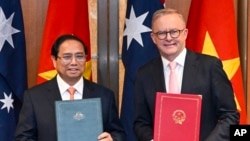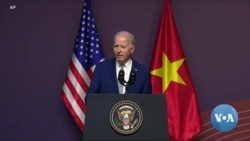A new, closer diplomatic relationship between Australia and Vietnam is drawing warnings from China against forming "exclusive circles" in the Indo-Pacific region.
Chinese Foreign Ministry spokesperson Wang Wenbin said at Monday's daily news briefing, "To advocate bloc confrontation and build exclusive circles goes against the trend of the times and the common aspiration of regional countries."
Although Wang did not mention Vietnam or Australia by name, he was responding to a question posed by one of China's official media outlets, Shenzen TV, about an agreement the two nations signed March 7.
Longtime observers of Vietnam's diplomacy say Beijing's response to the Comprehensive Strategic Partnership (CSP) reveals its unease with Hanoi's push to upgrade ties throughout the region.
In August, Vietnam signed a CSP with the United States, China's rival.
A CSP is the highest level in Vietnam's diplomatic hierarchy, a relationship Hanoi maintains with China, India, Japan, Russia and South Korea. A CSP commits partners to cooperation on a wide range of concerns and typically contains a military dimension.
A joint statement issued March 7 by Vietnamese Prime Minister Pham Minh Chinh and Australian Prime Minister Anthony Albanese emphasized that the nations share a common vision of a peaceful, stable, independent and prosperous Indo-Pacific region.
It also mentioned a joint commitment to the "settlement of disputes, including those in the South China Sea, by peaceful means without resorting to the threat or use of force, in accordance with international law." China's increasingly aggressive claim of sovereignty over those waters has met challenges from Brunei, Malaysia, the Philippines, Taiwan and Vietnam.
Pham Thu Hang, spokesperson for Vietnam's Ministry of Foreign Affairs, said Thursday at a news conference, "The upgrade of Vietnam-Australia relations to a Comprehensive Strategic Partnership is a natural development step and in line with the level of relationship between the two countries after more than 50 years of establishment and development, for the common interests and aspirations of the people of the two nations and for peace, stability, cooperation and prosperity in the region and the world."
The Australian Ministry of Foreign Affairs and Trade did not respond to VOA's request for a comment on Wang's remarks. Instead, the ministry referred to Albanese's statement from the day the CSP was signed.
"Australia and Vietnam share an ambitious agenda across climate change and sustainability, digital transformation and innovation, defense and security, economics and trade, and education," he said, adding that the CSP reflects "our cooperation, our strategic trust and shared ambition for our region."
"China is of course concerned," said Ha Hoang Hop, an associate senior fellow with Singapore's ISEAS Yusof Ishak Research Institute. Speaking on the telephone with VOA Vietnamese from Hanoi on Monday, he said, "China may, in fact, be concerned that Vietnam may move closer to the United States and its allies. But China cannot be offended because Vietnam first aims to create a security balance."
The CSP "is both beneficial for Vietnam and beneficial for our comprehensive strategic partners, including China. … The establishment of partnerships is not intended to create factions or cause trouble for countries in the region," said Ha. "Everyone is aware that it only creates a better environment for development cooperation, and more broadly, ensuring peace and prosperity for the Asia-Pacific region."
The agreement with Australia reflects Vietnam's “bamboo diplomacy” as its ruling Communist Party tries to navigate rising regional and global tensions. The reference is to the bamboo plant’s qualities of adaptability and resilience.
Vu Duc Khanh, a law professor at the University of Ottawa who follows Vietnamese politics, told VOA Vietnamese via email on Monday that although he can understand China's reactions, he believes it is too early for Beijing to be overly concerned by Vietnam's latest CSP. He pointed to Hanoi's endorsement in December of China's "community of common destiny" with objectives of "common development" and "common security."
"China's comments [are] largely in line with its strategy of keeping Vietnam neutral," said Vu Xuan Khang, a doctoral candidate at Boston College who specializes in international security.
"China does not want Vietnam to join any blocs made up of countries that China sees to be anti-China because Vietnam could then become a springboard for those countries to hurt Chinese interests," Vu Xuan wrote to VOA via email on Monday.
"Vietnam thus needs to be careful and should not stoke too much Chinese suspicion to avoid unnecessary Chinese retaliations," he added.
On March 9, the Vietnam News Agency quoted emeritus professor Carl Thayer of the Australian Defense Force Academy, University of New South Wales, as saying that upgrading bilateral relations to a Comprehensive Strategic Partnership will create opportunities for more in-depth discussions on various issues between Vietnam and Australia, noting that most Australians support strengthening this relationship, especially in the field of education.
Thayer believes that Australia will prioritize cooperation with Vietnam and promote dialogue, helping both countries to deal with future challenges such as climate change, economic instability, and competition between world and regional superpowers.








